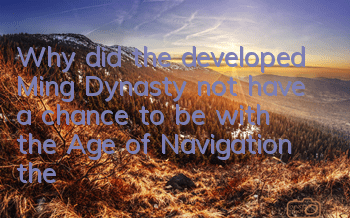The shipbuilding industry was developed in the Ming Dynasty. Why did Zheng He voyages to the West seven times, but he failed to enter the era of great navigation?
During the Yongle period of the Ming Dynasty, China's shipbuilding industry was quite developed. Zheng He took a large fleet to the West seven times, allowing the Ming Dynasty's famous broadcast of the "world". Countless leaders of small countries along the way came to the Ming Dynasty to "check in". They were amazed at the prosperity and prosperity of the Ming Dynasty. Even some leaders of small countries did not want to leave when they came.
This is the "prosperous era", the so-called "all nations come to pay tribute", probably this is the case!
However, such a good foundation in shipping manufacturing failed to create the glory of the West as the "Age of Great Discovery", but the "two teeth" of the Iberian Peninsula created magic.
Why is this?
Where was the problem in the Ming Dynasty? Why did it not enter the "Age of Discovery"?
1. "The Heavenly Kingdom is conceited" and fails to see the world
The five thousand years of humanistic history in China, various schools have emerged one after another, with brilliant culture, strong military affairs, and great economic value.
Look at Qin Emperor and Han Wu, Tang Emperor and Song Ancestor, Genghis Khan, and Hongwu of the Ming Dynasty, they are all emperors who have never been in the past. The unified dynasty they created or developed and expanded had unparalleled strength and created a brilliant culture.
In these glorious unification dynasties, there is a view of the "Oriental Center Theory". And this view has been passed down from generation to generation with the inheritance of culture.
In the eyes of the major dynasties in China, they are the center of the world, and remote areas and overseas areas are all barbarians. This made China so full of conceit that she called herself the "Celestial Empire" to the outside world. Even during the Qing Dynasty, foreign envoys came to visit and asked to kneel down.
From the perspective of strength, the actual situation of the unified dynasty in China is roughly the same. In the same era, whether it is military, economic, or prosperous, it ranked first in most of the time.
When you take the Internet term, China ranks second, and no one dares to rank first.
Of course, except in the middle and late Qing dynasties.
Although the unified dynasty changed royal families in history and there were several brief chaos in the middle, overall, the unified dynasties in China lasted for a long time, and the emperor and his ministers were not interested in overseas "small countries". What advanced is the barbarian country? Look at my prosperous China era, look at the happy life of my billions of people...
A person is arrogant, he will not make progress, and a country is arrogant and will only be self-confidence.
The history of the unified dynasty of China is a kind of "sense of superiority". This sense of superiority makes the country uninterested in exploring overseas, and does notI believe there are still richer places than China, and I don’t believe there are even smarter emperors and ministers than China.
Such thinking and views have influenced the overall pattern of observing the world and accepting the world.
The condescending momentum of the unified dynasty was also possessed by Zhu Di, the Emperor Chengzu of the Ming Dynasty.
In addition to his outstanding military capabilities, he has a set of governance of the country. He is not very interested in expansion and exploration. He likes the feeling of the coming of all countries. Letting it learn from a "small Western country" is simply a "joke".
Since you look at the earth in the center of the universe and China in the center of the earth, then there is no place on the earth that can be appreciated or nostalgic for others except China.
So, with this full of conceit, the most superiority in the world, and the sense of responsibility to let "all nations come to the court", Zheng He's voyage to the West was just broadcasting the name of benevolence and righteousness, telling the story of the Eastern Celestial Empire, and fooling small countries into the East to see it.
However, during Zheng He's voyage to the West, it was the dark medieval era in Europe, so it was naturally difficult to see prosperity and prosperity. In addition, Zheng He only advanced along the land and contacted some countries near the sea. As for England, France, Germany, Rakshasa, and Italy, he never encountered any of them.
Seeing a tree, defining a forest. I saw the small country by the ocean, which defined the situation in the world.
This kind of thinking obviously greatly affected the vision of Zheng He and the Ming Chengzu Zhu Di.
In this way, we naturally cannot enter the Age of Discovery.
2. The Celestial Empire advocates "benevolence and righteousness" and does not like "killing"
Columbus
If there is food, who is willing to take the risk of fighting with the tiger?
If you think your family has a gold mine, who is willing to cross mountains and rivers to steal?
Why did the West create the Age of Discovery? Because they experienced the darkness and various wars of the Middle Ages, they needed wealth and territory expansion, but in a small place, they restricted development, what should they do?
So, there were sailing expeditions by Columbus and Magellan.
At the beginning of the expedition, the purpose was very simple. In fact, it was to bypass the Middle East, go to India and even further east, and import tea, spices, etc. through waterways.
Therefore, after Columbus discovered the New World, he called the locals "Indians". When he was dying, he believed that he was in India.
The "Two Teeth Country" has successfully explored, and the next step is to reap wealth. The success of Portugal and Spain has led to the jealousy of Western countries, and France, England, etc., to explore overseas.
Go to other people's areas and expand territory meansControl is not easy, the easiest way is to kill.
In this way, indigenous people on the American continent were killed on a large scale by European countries. In order to gain more benefits, England and France immigrated to the American continent. They found that there was more land there, and they also found that there was more wealth there.
The era of great navigation accelerated the integration of the world, integrated resources, and promoted the development of the world. But at the same time, this process is accompanied by massacre and bloody storm.
Age of Discovery, while creating miracles and wealth, it also turned on the bloody slaughter button.
Authentic, after the massacre, a country like the United States was born on the vast American continent, but who can deny that the United States itself is a blooming poppy flower?
The Ming Dynasty, with money, land and people, was an absolute unified country. They disdained the expansion of overseas. They had room for expansion and did not bother to travel across the ocean to explore. If they fought too much, they had to work hard to protect. It would be better not to expand.
In the Ming Dynasty, Confucianism was still the foundation of culture. Confucianism advocated benevolent politics and took huge risks to kill others for some wealth. This was something the Ming Dynasty disdained. In the Ming Dynasty, if you are disobedient, you will be beaten up hard, but how could the Ming Dynasty kill overseas barbarians without hatred?
Sometimes this is how it is. When the country is big, it will lose momentum for expansion. Only when the country is small and the wealth is low will we strive to explore overseas.
Obviously, Portugal and Spain are hiding in the Iberian Peninsula, with limited expansion and discovering a new world, how could they be unhappy?
Although Britain is a powerful country with maritime power, its local area is too small and its resources are too small. Although France was a little bigger, it still faced the influence of Prussia, Italy, and even further away Russia. Therefore, when the French saw the British sending Puritans and criminals to the American continent, they also began to follow up and became one of the colonial overlords of the American continent.
In a word, the Ming Dynasty implemented monarchy, great unification, and Confucian culture. All of this determined that the Ming Dynasty would not use a big knife to open up the way, slaughter the indigenous people, and explore overseas colonies. Even if Zheng He went overseas, he would not aim to open up colonies.
Zheng He's fleet looks like a propaganda team.
3. The Ming Dynasty went to sea and had another main purpose
The development of the shipbuilding industry in the Ming Dynasty was related to Chen Youliang. In order to unify the world, he hired many skilled craftsmen to build large ships and engage in water wars. Unfortunately, in the battle of Poyang Lake, he lost to Zhu Yuanzhang.
Zhu Yuanzhang took over Chen YouliangThe shipbuilding technology used by Zheng He to voyage to Western ships is directly related to Chen Youliang.
Zheng He had two lines on his voyage to the West. The open line was to promote the bright light, and the secret line was to find Emperor Jianwen Zhu Yunwen.
The Ming Dynasty at that time was a pure agricultural society with a large economic value, but industry and commerce were very underdeveloped and there was no concept of economic and trade. However, the Ming Dynasty was very good at showing the authority of the emperor and demonstrating the might of a great country.
Because there was no plan for invasion, nor any economic and trade ideas, and only the national prestige and the search for Emperor Jianwen, Zheng He's voyage to the West had less real meaning.
After the Ming Dynasty, the huge land had already met their basic needs and had no intention of developing the "overseas market". Even if they went to the West, they could only promote their national prestige and find people. In this way, the "Age of Discovery" and the Ming Dynasty were basically out of reach.
The fundamental reason is determined by the system and national conditions of the Ming Dynasty.
Some people say that the West was able to enter the Age of Discovery because it experienced the black medieval era. At that time, it was very poor and chaotic. If it was poor and chaotic, it would change, and if it changed, it would be more innovative.
As a unified Ming Dynasty, it adopted a monarchy, and the society was relatively stable. The monarchy enslaved people's ideas, and what was stable was the ability to innovate.
So, it is highly likely that it will be possible to experience Europe in the black medieval era. The unified Ming Dynasty and even other unified dynasties in China opened the era of great navigation is a very small probability.









